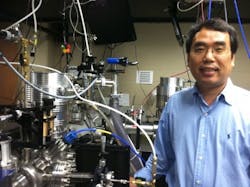World-record attosecond pulse achieved by UCF researchers
Orlando, FL--The world's shortest laser pulse has been created by a University of Central Florida (UCF) research team, giving scientists a new tool that can watch quantum mechanics in action. Professor Zenghu Chang from the Department of Physics and the College of Optics and Photonics at UCF led the effort that generated the 67 attosecond pulse of extreme ultraviolet (EUV) light. The results of his attosecond research are published online in Optics Letters.
Chang's group created a technique called Double Optical Grating that allows extreme ultraviolet light to be cut off in a manner that concentrates the maximum amount of energy in the shortest possible pulse of light. With the affinity for acronyms shared by many ultrafast laser physicists, Chang named the technique DOG. In addition to creating the light pulse, he created an even faster camera to measure it, which is the Phase Retrieval by Omega Oscillation Filtering (PROOF).
The accomplishment is quite remarkable because the team did it without the use of specialized equipment including a mile-long particle accelerator or a Superdome-sized synchrotron. "Dr. Chang's success in making ever-shorter light pulses helps open a new door to a previously hidden world, where we can watch electrons move in atoms and molecules, and follow chemical reactions as they take place," said Michael Johnson, the dean of the UCF College of Sciences and a physicist. "It is astounding to imagine that we may now be able to watch quantum mechanics in process." The technique could lead scientists to understand how energy can be harnessed to transport data, deliver targeted cancer therapies or diagnose disease.
The finding marks the first significant breakthrough in the laser pulse field in four years. In 2001, attosecond pulses were demonstrated for the first time. Since then scientists around the world have been trying to make ever-shorter pulse durations because of the door they could open to understanding the subatomic world. The previous record of an 80-attosecond pulse was set in 2008 at the Max Planck Institute in Garching, Germany. This is the first time an American-led team has set the record.
Chang's team was able to accomplish the work at the Florida Atto Science &Technology (FAST) lab in UCF's Physical Sciences building. Others who contributed to the team's discovery include: Kun Zhao, Qi Zhang, Michael Chini, Yi Wu, and Xiaowei Wang, all at UCF.
SOURCE: University of Central Florida; http://today.ucf.edu/ucf-researchers-record-world-record-laser-pulse/
About the Author

Gail Overton
Senior Editor (2004-2020)
Gail has more than 30 years of engineering, marketing, product management, and editorial experience in the photonics and optical communications industry. Before joining the staff at Laser Focus World in 2004, she held many product management and product marketing roles in the fiber-optics industry, most notably at Hughes (El Segundo, CA), GTE Labs (Waltham, MA), Corning (Corning, NY), Photon Kinetics (Beaverton, OR), and Newport Corporation (Irvine, CA). During her marketing career, Gail published articles in WDM Solutions and Sensors magazine and traveled internationally to conduct product and sales training. Gail received her BS degree in physics, with an emphasis in optics, from San Diego State University in San Diego, CA in May 1986.
